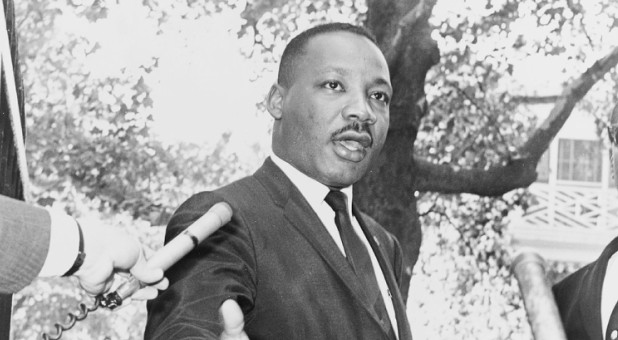Christians in 31 Cities to Commemorate MLK’s ‘I Have a Dream’ Speech
August 28 marks a historic anniversary for the nation and the Black communities within America. It’s the day when, in 1963, Rev. Martin Luther King delivered his famous “I Have A Dream Speech” to marchers gathered around the Lincoln Memorial in Washington, DC.
In commemorating the Baptist minister’s address heard around the world, Christians in 31 cities will gather for the third annual Pray on MLK Sunday, Aug. 28.
Two countries and 11 states will play host to prayer gatherings along boulevards, monuments and buildings that honor the name, life, legacy and memory of the civil rights leader.
Since the first Pray on MLK in 2020, three nations have joined 356 cities in 50 states in creative expressions of prayer for justice and righteousness.
Twenty-six leaders from diverse denominational and ethnic backgrounds have hosted spoken prayer events or silent protests to the Lord—called a wall—where altars of pain are transformed into joyful cries of praise-filled intercession.
Pray on MLK is one initiative of Civil Righteousness, a movement committed to the fame of Jesus and—as Ephesians chapter two reveals—the body of Christ advancing as one the virtues of truth, justice and reconciliation.
The founder and president of Civil Righteousness (Civil Righteousness, Inc. – Home), Jonathan Tremaine Thomas, is a ministry leader in Ferguson, Missouri.
Also a pastor and missionary, Thomas says Civil Righteousness is committed to continuing the historic movement inspired by God working through MLK, Jr., who advocated for change through legislative reforms and public policy.
The movement, if stewarded well, might lead to an era of civil righteousness, Thomas believes.
“I know that sounds lofty and crazy but civil righteousness has to be something the church is doing and pursuing,” says Thomas.
Today, the preeminent cultural voice for justice and righteousness—Black Lives Matter—lacks biblical influence.
“There was a supernatural spirit of wisdom that was released to the leaders of the historic civil-rights movement fueled by Judeo-Christian values,” says Thomas.
He notes that Pray on MLK was a spiritual response to the international grief over George Floyd’s tragic death under the knee of a Minneapolis, Minnesota police officer.
“We were able to mobilize Pray on MLK gatherings in a matter of weeks because our emotions were heightened,” Thomas says.
At a Pray on MLK in Washington state last year, expressions of repentance and blessing inspired a pastor who, after 40 years of attending similar reconciliation events, witnessed a first.
A biracial couple publicly repented on behalf of Blacks and Whites as the Holy Spirit revealed the sins they had committed against each other.
“It honestly felt like wedding vows,” recalls Ellie Hardy, who organized Pray on MLK in Otis Orchards, Wash. “It was so beautiful and hit the mark in the Spirit,” she says.
The couple then blessed Black and White churches, businesses and leaders.
In Austin, Texas, Pray on MLK organizer Rebecca Faubion likened the event to Jesus washing His disciples’ feet.
“I saw we were washing the dust of emotional pain, trauma, fatigue, alienation, loneliness and falsehood from each other,” Faubion recalls.
In another city, Pray on MLK attracted an Alcoholics Anonymous group, children, passersby and homeless people.
“As we prayed, we were changed by the realization that true transformation begins in the heart and matures outwardly as reformation,” recalls Martha Canizales Rodriguez of the people who joined her for the first Pray on MLK on August 8th 2020.
Pray on MLK is commemorating Dr. King’s speech in 1963 and, at the same time, Civil Righteousness is moving from streets of intercession to tables of reconciliation.
In early 2021, Thomas says he heard the Lord say: “I want you to set America’s table.”
Thomas began to think about the description of the Kingdom of Heaven in the Gospel of Matthew, chapter 22; it is likened to a wedding banquet table.
So last summer a huge table was erected in Ferguson, where Blacks, Whites, pastors, civic and business leaders gathered for a banquet outside a historic church’s parking lot.
“We’re calling the church into building the table for our cities where truth, reconciliation and reformation can happen,” says Thomas.
America needs to embark on a comprehensive, national truth and reconciliation journey, he believes.
“I believe that we need a national truth and reconciliation commission that’s led primarily by the church in concert with government and private-sector business owners,” Thomas says.
Pray on MLK is intended to be a first, Spirit-filled demonstration of intercession leading to deep reconciliation driven by the Holy Spirit—not by news cycles or the spirit of the age.
Thomas says the historic civil rights movement set goals—one of which was the Voting Rights Act of 1965. It was preceded by marches on Washington, D.C. and in Selma, Birmingham and Montgomery, Alabama.
“In the same way, our strategy is using Pray on MLK to stir up a movement that galvanizes the church in a new and fresh way,” Thomas says.
Church leadership is needed, Thomas says, but he knows God uses housewives and hard-working men who respond to simple text messages, too.
He thinks churches should offer their spaces for “mediated truth-telling” within entire cities.
At a national level, Black History Month is useful for provoking discussions about race relations in America.
But Civil Righteousness also envisions churches, city halls and college campuses as places for deeper dialogue and testimony from people about their stories of broken promises and treaties. {eoa}
Steve Rees is a former general assignment reporter who, with one other journalist, first wrote about the national men’s movement Promise Keepers from his home in Colorado. Rees and Promise Keepers founder Bill McCartney attended the Boulder Vineyard. Today Rees writes in his free time.














































